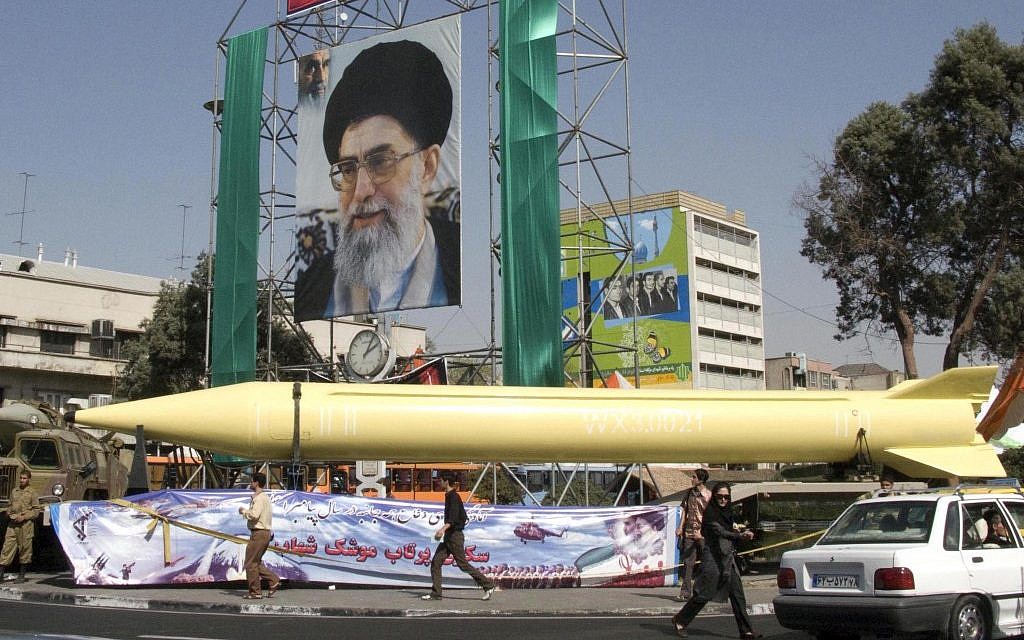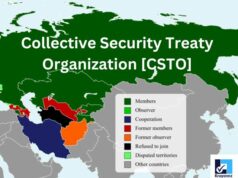When Israel Almost Bombed Iranian Nuclear Sites
 Israel made it clear in the years prior to the signing of the Iranian nuclear accord with USA and West European countries that it would not allow Iran to get within a year of being able to build a nuclear weapon.
Israel made it clear in the years prior to the signing of the Iranian nuclear accord with USA and West European countries that it would not allow Iran to get within a year of being able to build a nuclear weapon.
At the time, Israel and Azerbaijan discussed the possibility of the Israeli air force using Azerbaijani airbases should it opt to take out the Islamic republic’s nuclear facilities.
The Trump administration withdrew from the agreement in 2018 and re-imposed harsh economic sanctions on Iran.
The International Crisis Group, in an effort to pre-empt the tit-for-tat from escalating out of control, called this week for a US-Iranian military hotline. “A mechanism facilitated by a third party might contain the risk of conflict due to misreading signals and miscalculation,” the group said.
The International Atomic Energy Agency (IAEA) stated last month that Iran had nearly tripled its stockpile of enriched uranium and was refusing to answer questions about three possible undeclared nuclear sites.
Concerns about Iran’s military capability was boosted this week with the Islamic republic’s successful launch of a satellite and unveiling of a full-blown space program managed by the Revolutionary Guards.
A just-published study of the Iranian navy that concludes that “based on its doctrine of naval warfare, the Iranian revolutionary naval forces have embarked on a fast-paced rearmament and re-equipment program during the past two decades, aimed at offsetting the U.S. Navy’s military presence in the Persian Gulf region.”
Thus it is a fact now that Iran’s gradual breaching of the nuclear accord has put the Islamic republic within reach of the amount of enriched uranium needed to produce a nuclear weapon.
All of which demonstrates the failure of the United States’ maximum pressure campaign against Iran and the country’s abilities despite sanctions and a pandemic.
With the rising tension between the United States and Iran, President Donald J. Trump tweeted earlier this week that he had ordered the US Navy to destroy any vessels in the Gulf that harassed American navy ships.
Mr. Trump posted his tweet after Iranian Revolutionary Guard gun speedboats had made, according to the US, “dangerous and harassing approaches.”
The approaches were part of Iran’s strategy of gradual escalation that aims to bring the United States and the Islamic republic to the brink of war in a bid to force a return to the 2015 international agreement that curbed Iran’s nuclear program.
Iran has consistently denied that it aims to obtain a nuclear capability. It has breached the nuclear deal without abrogating the agreement that was also signed by China, France, Russia, Britain, Germany and the European Union.
Talk of an Israeli strike has not yet been revived amidst the current escalating US-Iranian tension, but that does not mean it will not. For this Israel may again rethink of using its Armenian Connections. Israel, with whom Armenia shared an experience of genocide are natural allies. In 1991 Israel had made a plan for bombing out the Iranian nuclear installations.
The main reason for aborting the mission was Armenia’s Turkic nemesis, Azerbaijan, with which it was at war over Nagorno Karabagh, an Armenian enclave on Azerbaijani territory.
“The calculation was simple. Azerbaijan has three strategic assets that Israel is interested in – Muslims, oil and several thousand Jews. All Armenia has to offer is at best several hundred Jews,” said an Israeli official at the time.
Azerbaijan had one more asset: close ties to Turkey, which supported it in the war against Armenia. As a result, Israel and Jewish organizations with long-standing ties to Turkey refrained for years from participating in annual commemorations of the 1915 mass murder of Armenians.
However now the Turkish President Recep Tayyip Erdogan’s strained relations with Israel and the West, his touting of implicitly anti-Semitic conspiracy theories, hollowing out of Turkish democracy and offensive against Syrian Kurds who played a key role in defeating the Islamic State, appears to have turned the tide.
The US Congress as well as major American Jewish organizations have laid Turkish objections by the wayside and recognized the mass murder of Armenian as genocide.
“One thing is certain: Armenians and Jews, two groups whose similar history makes them natural allies, will improve their relationships,” said historian and political scientist Marc David Baer.
Mr. Baer may have spoken too early. While relations with Turkey may no longer be a consideration, relations with Azerbaijan are. To be sure, Azerbaijan’s human rights record is hardly better than that of Turkey.
Yet, predominantly Shiite Azerbaijan, like Armenia, borders on Iran.



